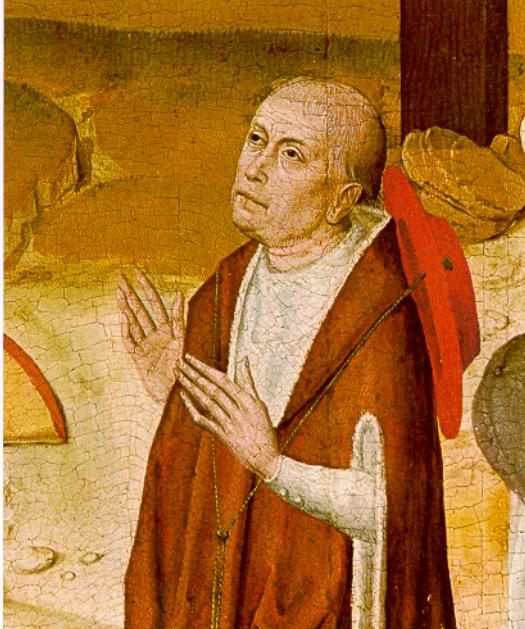“La cattolica fede è, che noi preghiamo un Dio in tre persone.”
Origine: Da una predica a Coblenza nel 1431; citato in Fiorentino, p. 19.
Nicola Cusano, noto anche come Niccolò Cusano o Niccolò da Cusa, in lat. Nicolaus Cusanus o Nicolaus de Cusa, in ted. Nikolaus Krebs von Kues o Nikolaus Chrypffs , è stato un cardinale, teologo, filosofo, umanista, giurista, matematico e astronomo tedesco. Wikipedia

“La cattolica fede è, che noi preghiamo un Dio in tre persone.”
Origine: Da una predica a Coblenza nel 1431; citato in Fiorentino, p. 19.
De docta ignorantia
Origine: Citato in Daniele Corradetti Metafisica del numero, Argonautiche, p. 11. ISBN 978-88-95299-16-7
“La ragione è la parola dell'intelligenza che in essa si specchia come in un'immagine.”
Origine: Da Sulle congetture.
Origine: L'uomo.
Origine: Da La pace nella fede, II, in Opere religiose, a cura di Pio Gaia, UTET, 1971.
libro I, cap. 1
De docta ignorantia
libro I, 2-10
De docta ignorantia
libro I, cap. 1 e 3
De docta ignorantia
libro II, cap. XI
De docta ignorantia
Origine: Da Visione di Dio; citato in Marie-Louise von Franz, Psiche e materia, Bollati Boringheri, 1992, p. 205. ISBN 978-88-339-0712-3
Origine: Citato in AA.VV., Il libro della filosofia, traduzione di Daniele Ballarini e Anna Carbone, Gribaudo, 2018, p. 96. ISBN 9788858014165
“The universe has no circumference”
ibid.
Contesto: The universe has no circumference, for if it had a center and a circumference there would be some and some thing beyond the world, suppositions which are wholly lacking in truth. Since, therefore, it is impossible that the universe should be enclosed within a corporeal center and corporeal boundary, it is not within our power to understand the universe, whose center and circumference are God. And though the universe cannot be infinite, nevertheless it cannot be conceived as finite since there are no limits within which it could be confined.
They subsequently accepted these laws, as if You, the King of Kings, had spoken with them face to face, and believed they heard not those men, but rather You in them.
De Pace Fidei (The Peace of Faith) (1453)
“Therefore since all men are free by nature, every government”
De concordantia catholica (The Catholic Concordance) (1434)
Contesto: Therefore since all men are free by nature, every government that restrains its subjects from evils and uses the fear of punishment to orient their freedom towards the good, whether it consists of written laws or of a living law in the person of the prince, is constituted only by the agreement and consent of the subjects. For if by nature men are equally powerful and equally free, then the true and well-ordered authority of one who is a fellow and equal in power can only be established by the choice and consent of others, just as laws are established by consent
“In God, absolute unity is absolute multiplicity, absolute identity is absolute diversity”
De Docta Ignorantia (On Learned Ignorance) (1440)
Contesto: In God, absolute unity is absolute multiplicity, absolute identity is absolute diversity; absolute actuality is absolute potentiality
“You know how the divine Simplicity enfolds all things.”
Mind is the image of this enfolding Simplicity. If, then, you called this divine Simplicity infinite Mind, it will be the exemplar of our mind. If you called the divine mind the totality of the truth of things, you will call our mind the totality of the assimilation of things, so that it may be a totality of ideas. In the divine Mind conception is the production of things; in our mind conception is the knowledge of things. If the divine Mind is absolute Being, then its conception is the creation of beings; and conception in the human mind is the assimilation of beings.
ibid.
There can be no excuse for disobeying the laws when each has established the law for himself.
De concordantia catholica (The Catholic Concordance) (1434)
“You know, Lord, that a great multitude cannot exist without much diversity”
De Pace Fidei (The Peace of Faith) (1453)
Contesto: You know, Lord, that a great multitude cannot exist without much diversity and that almost all are compelled to lead a laborious life full of troubles and afflictions, and in servile subjugation must be subject to the kings who rule. Hence it has occurred, that only a few men have enough leisure time to employ the freedom of their will and to gain knowledge of themselves. They are distracted by many corporeal cares and duties. Thus they cannot seek You, who are the concealed God.
De Pace Fidei (The Peace of Faith) (1453)
Great Thoughts Treasury http://www.greatthoughtstreasury.com/author/nicholas-cusa-also-nicholas-kues-and-nicolaus-cusanus?page=4
De Pace Fidei (The Peace of Faith) (1453)
“I behold Thee, 0 Lord my God, in a kind of mental trance”
De visione Dei (On The Vision of God) (1453)
“Thus, while I am borne to loftiest heights, I behold Thee as Infinity”
De visione Dei (On The Vision of God) (1453)
De concordantia catholica (The Catholic Concordance) (1434)
De Pace Fidei (The Peace of Faith) (1453)
De Pace Fidei (The Peace of Faith) (1453)
Theosophy Trust, Great Teachers Series http://www.theosophytrust.org/311-nicholas-of-cusa
Cribratio Alkorani (Sifting the Qur'an)
De concordantia catholica (The Catholic Concordance) (1434)
De docta ignorantia http://www.challzine.net/29/29extraterr.html
Cribratio Alkorani (Sifting the Qur'an)
“All we know of the truth is that the absolute truth, such as it is, is beyond our reach.”
De Docta Ignorantia (On Learned Ignorance) (1440)
De Pace Fidei (The Peace of Faith) (1453)